Richard H. Pratt forwards applications of four employees for leave of absence: Elizabeth E. Forster (drawing teacher), W. Grant Thompson (disciplinarian), Annie B. Moore (music teacher), and Jessie L. McIntire (teacher).
Pratt, Richard Henry
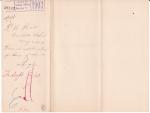
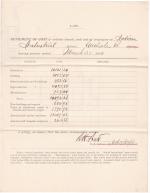
Richard H. Pratt submits a statement of cost form that lists the total amounts for subsistence, clothing, school materials and furnishings, light and fuel, miscellaneous expenses, new buildings and repairs, the value of subsistence raised by schools and issued to pupils, and pay for regular and irregular employees for the quarter ending March…
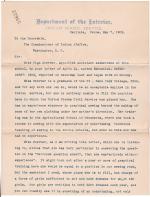
Richard Henry Pratt informs the Office of Indian Affairs that Olga Koerner who was appointed to the position of assistant seamstress is unable to fulfill the duties required from the position. Pratt details the work required of the position including supervising students to produce over 2200 dresses a year. He further details he has lost…
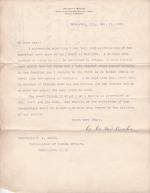
Charles C. McCabe, Bishop of the Methodist Episcopal Church, writes that he hopes Richard Henry Pratt can continue in his work at the Carlisle Indian School.
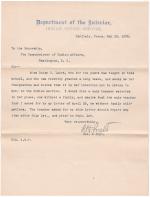
Richard Henry Pratt informs the Office of Indian Affairs of the resignation of Daisy C. Laird. Pratt requests a male teacher "without family obligations" for her replacement.
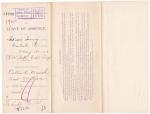
Richard Henry Pratt forwards Oella C. Munch's application for a twenty-two and a half-day annual leave of absence. Munch works as an assistant matron.
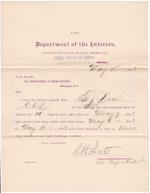
Richard Henry Pratt forwards a report on leave of absence for employee S. J. Nori (clerk).
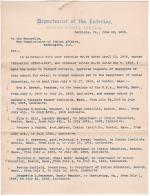
Richard H. Pratt forwards 22 approved leave of absence requests to attend summer school or the Department of Indian Education at Boston: Ella G. Hill (laundry manager), Frances A. Veitch (assistant matron), Kate S. Bowersox (assistant principal & normal teacher), Florence M. Carter (small boys' manager), Bertha Canfield (seamstress),…
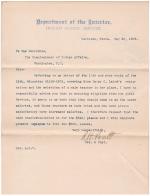
Richard Henry Pratt follows up on his request for a male teacher to replace Daisy Laird by stating that the Civil Service appointee should come in on the lower salary.
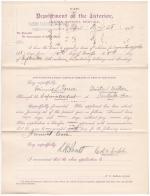
Richard Henry Pratt forwards Assistant Matron Minnie L. Ferree's application for a 28-day annual leave of absence.
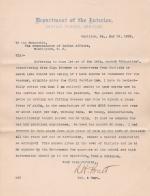
Richard Henry Pratt responds to an Office of Indian Affairs letter regarding the transfer of Olga Koerner to the Leech Lake School. Pratt notes that he has no recommendation for a replacement on the Civil Service lists and asks that a special exam be given for a local seamstress who is capable of filling in the position.
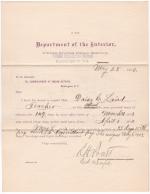
Richard Henry Pratt forwards a report on a leave of absence of employee Daisy C. Laird (teacher).
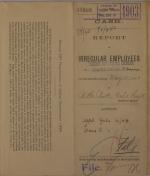
Colonel Richard H. Pratt submits a report that lists irregular employees who worked at the school during May 1903. The report includes details on compensation, position titles, race, and the number of days worked during that month.
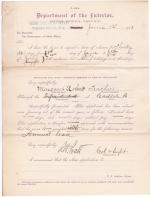
Richard Henry Pratt forwards Margaret Roberts' application for a 30-day annual leave of absence. Roberts works as a teacher.
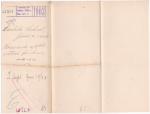
Richard H. Pratt forwards applications of three employees for leave of absence: Enoch M. Sherry (teacher), Jeannette L. Senseney (music teacher), and Mabel B. Sherry (teacher).
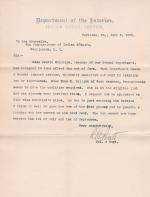
Richard Henry Pratt requests Emma K. Hetrick be appointed to fill the teaching vacancy left by the resignation of Jessie McIntire.
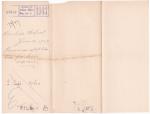
Richard H. Pratt forwards applications of three employees for leave of absence: W. S. Dysert (shoemaker), Anne H. Stewart (sloyd teacher), and Emma A. Cutter (senior teacher).
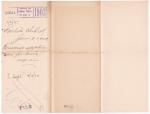
Richard H. Pratt forwards applications of two employees for leave of absence: Charles H. Carns (painter) and M. S. Barr (nurse).
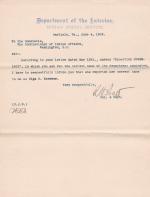
Richard Henry Pratt informs the Office of Indian Affairs that the correct name of the Seamstress nominated is Olga O. Koerner.
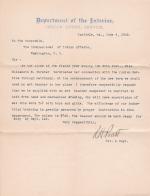
Richard Henry Pratt informs the Office of Indian Affairs that Elizabeth E. Forster is terminating her service and requests that a new art teacher be provided who can also teach mechanical drawing.
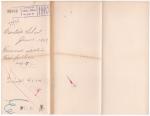
Richard H. Pratt forwards applications of seven employees for leave of absence: Agnes May Robbins (teacher), Frances R. Scales (teacher), E. G. Sprow (laborer), W. B. Beitzel (clerk), Florence M. Carter (small boys' manager), William G. Snyder (laborer), and Mariette Wood (teacher).
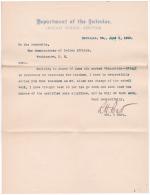
Richard Henry Pratt informs the Office of Indian Affairs that Edgar A. Allen will examine the papers of eligible male teachers shortly.
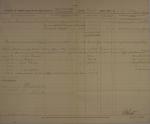
Estimate of funds for the fourth quarter of 1903 amounting to $7,300.00 for areas covering student transportation and supplies. Richard Henry Pratt also requests a credit of $5,644.54 to the school's account. An explanatory cover letter is attached.
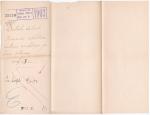
Richard H. Pratt and Edgar A. Allen (acting superintendent) forward applications of three employees for leave of absence: Ed. A. Lau (carriagemaker), Frank T. Reising (teacher), and Effie G. Moul (assistant matron).
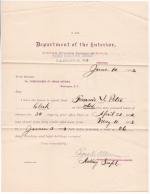
Edgar A. Allen (acting superintendent) forwards two reports on two employees' leaves of absence: Carrie E. Weekley (matron) and Fannie I. Peter (clerk).
